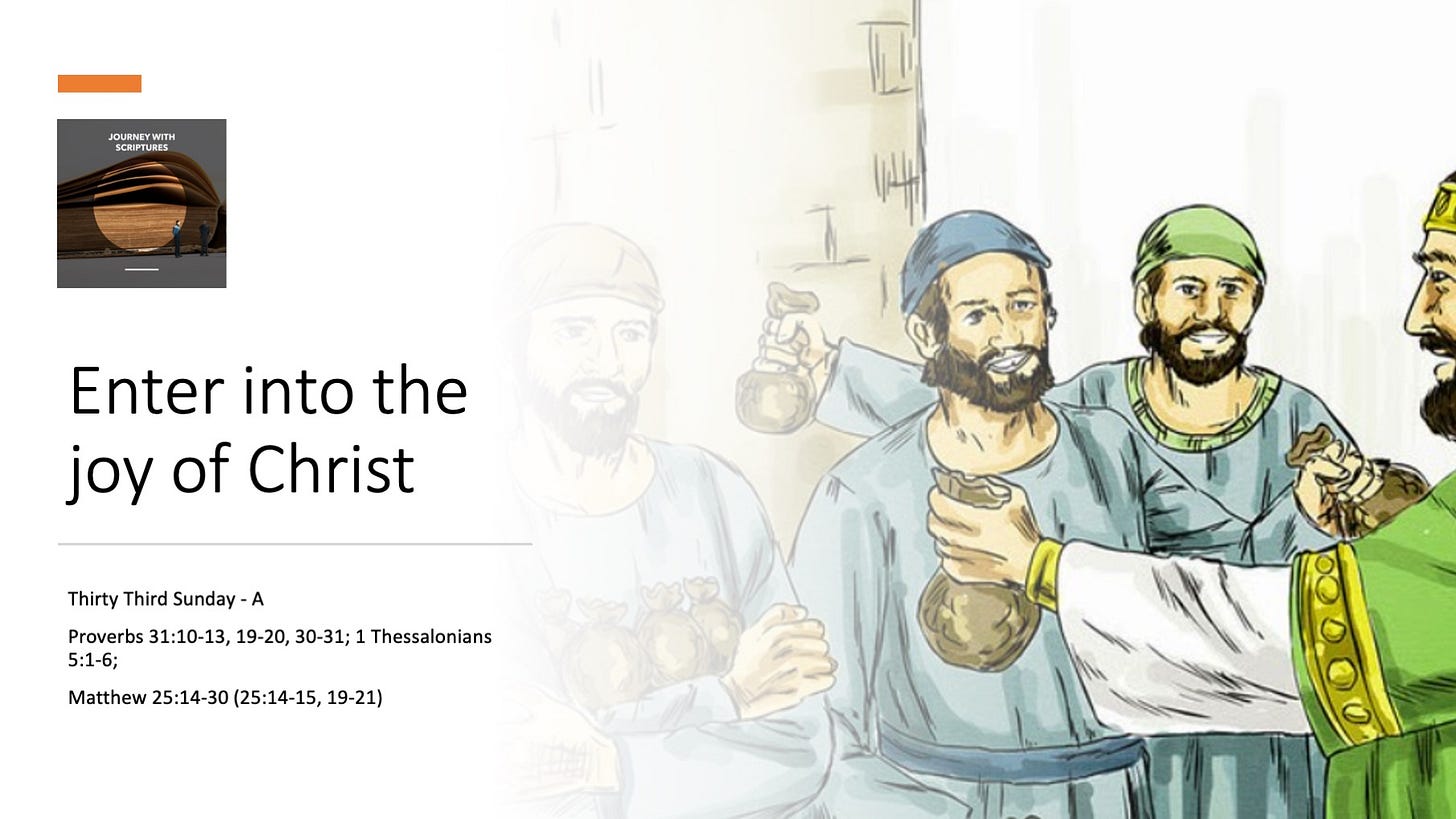Proverbs 31:10-13, 19-20, 30-31; 1 Thessalonians 5:1-6; Matthew 25:14-30 (25:14-15, 19-21)
The mission of the Church takes place between the Ascension of Christ and His coming in glory at the time unknown to us. The importance of being engaged in this mission is the subject of today's liturgy of the Word. We are called to become like a "worthy woman" (Prov. 31:10-13), imitate the servants who doubled the number of talents (Matt. 25:20,22), and be children of the light (1 Thess. 5:5; Matt. 5:14) in a world that remains in the darkness of sin.
A man going on a journey entrusted his possessions to his servants (Matt. 25:14). In the Old Testament, God entrusted to us the care for the earth (Gen. 1:28; 2:15), and then He entrusted His Law to Israel (Ezek. 20:11). In the New Testament, Christ has entrusted to the apostles the task of proclaiming the Gospel to the nations and teaching all the people the truths of faith and morality (Matt. 28:19-20). By entrusting to us "his possessions", God shows that He trusts us and expects our cooperation with His grace.
"Who can find a worthy woman?" (Prov. 31:10). Christ has found her! The woman whom her husband trusts, who is good to him and obtains wool and flax (Prov. 31:10-13) is a symbol of the Church, His Bride. The Church faithfully guards and hands down to others the deposit of faith received from her Bridegroom. Through preaching the Gospel, teaching the truths of faith, and performing the works of mercy, the Church extends her hand to the poor of this world (Prov. 31:20).
"To each according to their abilities" (Matt. 25:15). In the Church, we have various gifts according to the grace given to us (Rom. 12:6). None of us is self-sufficient, so we need each other, and none of the gifts is so small to be considered insignificant (1 Cor. 12:21-23). When we “immediately” put those talents to use (Matt. 25:16-17) we show our responsible attitude towards being disciples of Christ (1 Thess. 5:5; Matt. 5:14), and contribute to the common good of all (1 Cor. 12:7).
But one servant buried his talent in the ground (Mt 25:18). Why did he do that? Was he really "lazy" (Mt 25:26)? The basic meaning of that adjective in Greek indicates timidity, hesitation, and unreadiness. While other servants traded with their talents, that servant procrastinated and delayed his decision until it was too late. We do not know what he was doing during his master's absence. However, we can assume that for him the "day of the Lord" really came "like a thief at night" (1 Thess. 5:2).
"Master, I knew you to be a hard man" (Matt. 25:24). The servant dares to blame his master for his inaction. "You reap where you did not sow, and gather where you scattered no seed" (Matt. 25:24). Does the servant insinuate that his master is like Pharaoh, who ordered the people to make bricks but did not give them straw (Ex. 5:7)? But, the truth is different. His master wanted to gather where he did sow. He gave him one talent, and so he had no excuse. If the others could bring fruits, why not him as well?
"Here, you have what is yours" (Matt. 25:25). This impudent statement stands in opposition to the statement of his fellow servants: "Lord! You have entrusted me with five (two) talents. Here, I have made five (two) talents more" (Matt. 25:20,22). And so instead of sharing the joy of his master, he ended up in "the darkness outside, where there will be wailing and grinding of teeth" (Matt. 25:30). All those who ask for a reason to serve God and keep his commandments (Job 21:15; Mal. 3:14) can find an answer in this parable.
"You were faithful in small matters" (Matt. 25:21,23). God does not demand something impossible from us. If we build our family on Christian values and support the poor (Prov. 31:15-20), if we use God's gifts responsibly (Matt. 25:20,22) and live by faith, hope, and love (1 Thess. 5:8) we shall also hear: "enter into the joy of your Lord" (Matt. 25:21,23). Amen.




